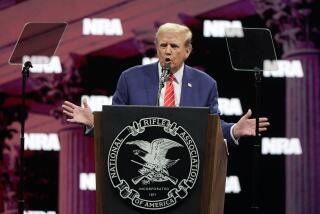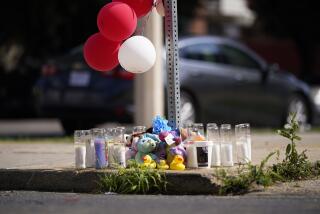Bush Says Gun Control Answer Lies With States
- Share via
WASHINGTON — President Bush, admitting that he is stymied in the search for an appropriate gun control policy, said Monday that he believes the answer to growing questions about access to powerful firearms “is going to be found in various ways out in the states” and not in Washington.
“The country needs to know that there is some answer to this. And I don’t yet know what it is,” he said.
White House Press Secretary Marlin Fitzwater said that no presidential decisions on gun control are likely until an Administration review of the issue is completed.
Bennett Views
William J. Bennett, director of the Administration’s Office of Drug Control Policy, indicating that he has stepped up the pace of his part in the review, has said that he would deliver recommendations to the President within two weeks. But Fitzwater said Monday that the review--of which Bennett’s recommendations are a part--might not be completed for 90 days.
Officials at the Bureau of Alcohol, Tobacco and Firearms, who had been considering widening the ban that Bennett announced last week on importing assault rifles, are now indicating that no such immediate action is expected.
Bush, speaking to a group of state legislators invited to the White House, adopted a low-key approach to the volatile national debate over gun control that has been fueled in part by Bennett’s ban. “It’s not a time to be threatening people. It’s a time to work out solutions to the problem,” Fitzwater told reporters.
In another matter related to the federal war on drugs, sources familiar with the President’s thinking said that Bush has not ruled out the possibility of using federal force to combat the drug trade in Washington, which Bennett has declared a high-intensity drug trafficking area where the government will concentrate its anti-drug efforts.
Bush is awaiting recommendations from his advisers. One possibility that has been discussed is the use of National Guard troops.
On the issue of semiautomatic rifles, senior Administration officials said Friday that Bennett had become the target of a National Rifle Assn. campaign to pressure him into stepping back from action that, if continued, could lead to a ban on all such assault rifles.
Seeks Accommodation
The President told the legislators that “we can find accommodation between the legitimate interests of the sportsmen and the interests of the police chiefs in protecting their people who put their lives on the line every single day.”
Law enforcement officials nationwide have been pressing for restrictions on semiautomatic assault rifles by noting that they are drug dealers’ weapons of choice. Their argument has been receiving growing support as violence linked to drug trafficking has risen markedly in several major cities.
The NRA has been trying to head off efforts to limit public access to the weapons, asserting that they have legitimate sporting uses and that the rights of all citizens should not be limited because of the crimes of a small minority.
The issue has been particularly touchy for Bush because he is a longtime NRA member and enjoys the political support of many of its members.
Signs of Support
“I am convinced that reasonable men and women can work together to find an answer to the problem of these automated weapons,” Bush said in his speech. “And I think we’ve already had some signs in the sporting community that there is support for what we’ve done. But we’re going to keep working it.”
The President pledged that in his Administration’s effort to develop a policy on the weapons, “we’ll find some answer that is constitutionally sound and that also protects the lives, as best one can from Washington, of these (police) officers.”
Fitzwater said that the review under way within the Administration would “allow all sides to air their views.” He said that White House Chief of Staff John H. Sununu met Friday with representatives of the NRA.
Opposition Softens
Fitzwater acknowledged that “there’s been some evolution” in the President’s thinking on gun control. His opposition has softened as First Lady Barbara Bush, Los Angeles Police Chief Daryl F. Gates and other supporters and advisers have advocated government action.
Fitzwater said the review involves “defining guns and uses and particularly judging them . . . about their sportsmen purposes.”
Earlier in the day, Bush attended the swearing-in of career diplomat Thomas R. Pickering as the U.S. ambassador to the United Nations.
Secretary of State James A. Baker III administered the oath to Pickering. “I want Ambassador Pickering to give the question of human rights a high profile at the United Nations,” Bush said. He praised Pickering, 67, as a “skilled diplomat, a veteran of high-priority, tough assignments.”
More to Read
Sign up for Essential California
The most important California stories and recommendations in your inbox every morning.
You may occasionally receive promotional content from the Los Angeles Times.













